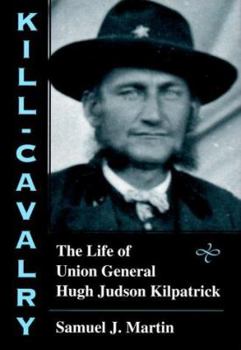Kill-Cavalry
Select Format
Select Condition 
Book Overview
This is a biography of an antihero, Samuel Martin writes in his prologue. Hugh Judson Kilpatrick was one of the most notorious scoundrels in the Union army. He lied, thieved, and whored his way... This description may be from another edition of this product.
Format:Hardcover
Language:English
ISBN:081170887X
ISBN13:9780811708876
Release Date:January 2000
Publisher:Stackpole Books
Length:325 Pages
Weight:1.43 lbs.
Dimensions:1.2" x 6.2" x 9.3"
Customer Reviews
1 rating
Biography of a controversial cavalry commander
Published by Thriftbooks.com User , 18 years ago
To say Hugh Kilpatrick was a controversial figure would be an understatement. Small in stature, it's my opinion he suffered from the "little man" complex: he attempted to over-compensate for his slight physical size by his recklessness and bravado. This would explain his rashness regarding his plan to attack Richmond and free the prisoners there, which was repulsed decidedly by the Confederates (though Sheridan attempted the same thing 10 weeks later with the same results). Disparaged by many of his fellow officers (Sherman called him a "damned fool"), it's also reported that his men respected him. Martin is highly critical. Kilpatrick was born in New Jersey in 1836 and graduated from West Point the year the Civil War broke out. He commanded a number of New York Cavalry brigades during the first two years of the war, receiving a serious wound at Big Bethel and then seeing much action in Virginia. After participating in the largest cavalry engagement of the war at Brandy Station in June 1863, he was promoted to brigadier general. He was conspicuous at Gettysburg, where his orders to E.J. Farnsworth to attack Hood, who was well-positioned behind stone walls, on the third day caused much slaughter to Farnsworth's men and Farnsworth's own death from five separate wounds. In the winter of 1864 he made his ill-fated attack on Richmond which resulted in failure. In the spring of that year he served in the Atlanta campaign and was wounded seriously for the second time at Resaca, GA. Recuperating by August, he performed well as commander of cavalry during the Carolina campaign and was a major factor in the capture of Fayetteville, NC, in March 1865. After the war he was appointed U.S. Minister to Chile, where he died in 1881. Martin's dislike for his subject is quite clear. In this he joins a long list of historians, most of whom regard Kilpatrick as showing poor judgment and costly wantonness. He finds his failure at Richmond to be his worst mistake. Despite this, however, I thought the book was interesting and well written, and made an honest attempt to capture the life of the man for the reader. The book also contained excellent maps and clear elucidation of military affairs. Not the definitive work on Kilpatrick, but not one for the waste heap, either.






